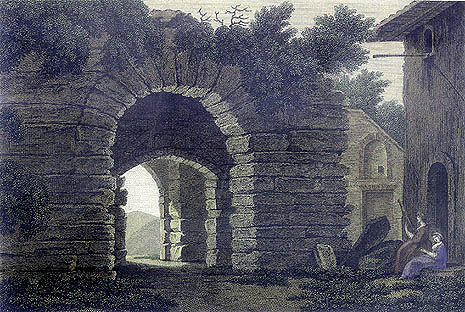| Title: |
Etruscan Gateway at Volterra |
| Engraver: |
Byrne, William (London, 1743 - 1805) |
| Engraver: |
Sparrow, James (British, active, 18th c.) |
| Designer: |
Smith, John (Irthington, Cumberland, 1749 - London, 1831) |
| Date: |
1799 |
| Medium: |
Original Hand-Colored Engraving |
| Publisher: |
John Emes, William Byrne & John Smith, London |
| Note: |
William Byrne: One of England's
finest landscape engravers of the late eighteenth century, William Byrne
studied engraving techniques first under his uncle and then in Paris,
under Aliamet and J. G. Wille. During his career, William Byrne was commissioned
to engrave topographical and landscape views after such artists as Thomas
Hearne, Francis Smith, Richard Wilson and Claude Lorrain. He also collaborated
on a number of plates with the great stipple engraver, Francesco Bartolozzi.
William Byrne illustrated some fine sets during this time, such as Antiquities
of Great Britain and Scenery of Italy. Among his most
famous individually published engravings are The Death of Captain
Cook, Horse at Play (after Stubbs), The Falls of Niagara, Morning
and Evening. |
| |
William Byrne was the father and teacher
of Letitia Byrne (1779-1849), John Byrne (1786-1847) and Elizabeth Byrne.
All three became prominent early nineteenth century etchers and engravers. |
| |
John Smith: One of England's greatest eighteenth century watercolor
artists, John Smith studied under Sawrey Gilpin, at the Royal Academy.
In 1786 Smith first accompanied Lord Warwick to Italy, where he lived
and worked for more than a decade. For this reason he acquired the nicknames
of 'Warwick' Smith and 'Italian' Smith, the names
he is commonly referred to to this day. |
| |
In the last decade of the eighteenth century John Smith travelled
throughout the length of Italy, sending fine watercolors back to London
where they were engraved and hand-colored by such artists as John Landseer,
B. T. Pouncy, J. Roffe, James Sparrow and William Byrne. In total over
seventy-five engravings were completed during an eight year period, with
John Smith also acting as the publisher in this venture. "Etruscan Gateway at Volterra"
dates hails from this period. |
| |
These magnificent Italian views established John Smith's
reputation as a leading artist. Upon his return to England he served
as a leading member of the Old Water-Colour Society, from 1805 to 1823,
and became its President in 1816. |
| Size: |
6 1/2 X 8 (Sizes in inches are approximate, height preceding width of plate-mark or image.) |
| |
Matted with 100% Archival Materials |
| Condition: |
Printed on late eighteenth century laid paper and with full
margins as published in London on the above date. Containing slight foxing
in the outer margins, else retaining its fine, unfaded hand colouring
and in good condition throughout. This beautiful Italian view entitled,
"Etruscan Gateway at Volterra" represents a prime example of the art
of John Smith, William Byrne, James Sparrow and of eighteenth century English
topographical art. |
| Subject: |
William Byrne, James Sparrow, John Smith, Etruscan Gateway
at Volterra, 18th century topographical art, 'Italian' Smith, Italian views |
| Price: |
Sold - The price is no longer available. |
| Important Information: |
The artist biographies, research and or information pertaining to all the original works of art posted on our pages has been written and designed by Greg & Connie Peters exclusively for our site, (www.artoftheprint.com). Please visit us regularly to view the latest artworks offered for sale. We will soon be posting an update of our most recent research and include the biographical and historical information pertaining to our next collection of original works of art created by artists throughout the centuries. We hope you found the information you were looking for and that it has been beneficial.
Our Gallery, (Art of the Print / www.artoftheprint.com) guarantees the authenticity of every work of art we sell 100%. Full documentation and certification is provided. We offer a wide selection of international fine art dating from the early Renaissance to the contemporary art period. |







![]()
![]() or
phone Greg & Connie (905) 957-6666
or
phone Greg & Connie (905) 957-6666